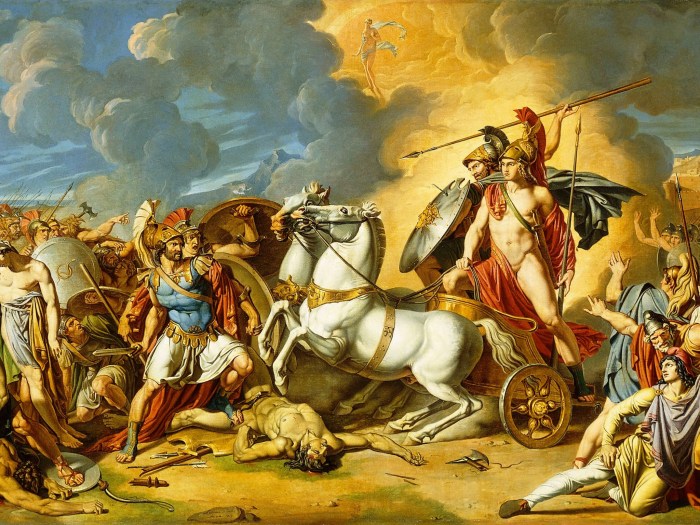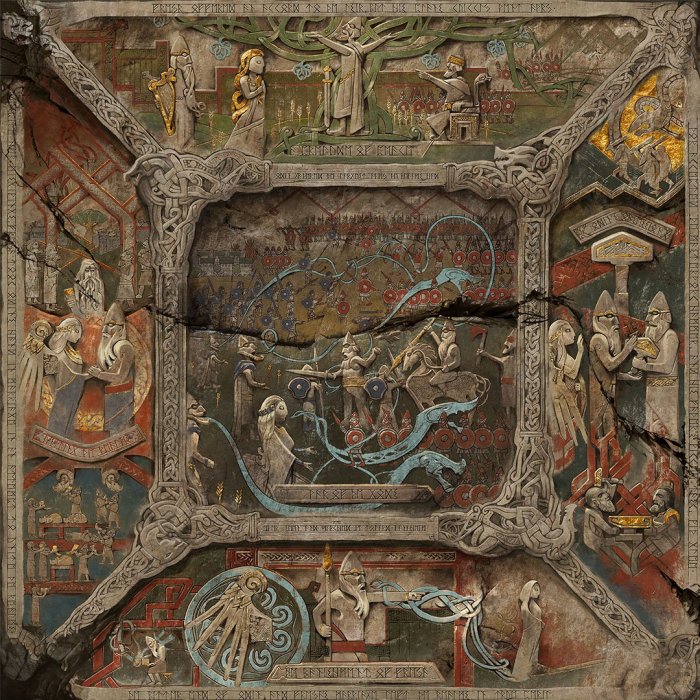Trojan War God Crossword Clue: Embark on an enlightening journey through Greek mythology, where gods and mortals clash in the epic Trojan War. At the heart of this conflict lies Ares, the formidable god of war, whose presence reverberates throughout the battlefield.
Delve into the origins and key events of the Trojan War, unraveling the intricate web of alliances and rivalries that shaped its course. Discover the pivotal roles played by the gods, whose motivations and interventions influenced the war’s trajectory.
Trojan War and Its Participants

The Trojan War was a legendary conflict fought between the Greeks and Trojans in the 13th century BC. The war is believed to have been sparked by the abduction of Helen, wife of Menelaus, King of Sparta, by the Trojan prince, Paris.
The Greeks, led by Agamemnon, King of Mycenae, besieged Troy for ten years, ultimately capturing and destroying the city.
Major Participants
Greeks:
Agamemnon
King of Mycenae and leader of the Greek forces
Achilles
The greatest Greek warrior
In the realm of crossword puzzles, the Trojan War god often stumps solvers. To unravel this enigma, consider exploring unit 24 quiz natural wonders for insights into ancient mythology and its captivating characters. The intersection of these topics may lead you to the elusive answer.
Odysseus
King of Ithaca and a cunning strategist
Menelaus
King of Sparta and husband of HelenTrojans:
Priam
King of Troy
Hector
The greatest Trojan warrior
Aeneas
A Trojan prince who survived the war and became the legendary founder of Rome
Paris
The prince who abducted Helen
The Role of Gods in the Trojan War
The Trojan War was not merely a conflict between mortals; it was also a battleground for the gods of Mount Olympus. The gods had their own motivations and alliances, which often influenced the course of the war.
Zeus, Trojan war god crossword clue
Zeus, the king of the gods, initially favored the Trojans but later switched his allegiance to the Greeks. His primary motivation was to maintain order and prevent the war from spiraling out of control.
Hera
Hera, Zeus’s wife, fiercely supported the Greeks. She harbored a deep grudge against the Trojans for snubbing her in a beauty contest.
Athena
Athena, the goddess of war and wisdom, was a staunch ally of the Greeks. She played a pivotal role in many battles, including the slaying of Hector.
Poseidon
Poseidon, the god of the sea, sided with the Greeks due to his long-standing rivalry with Troy’s patron deity, Apollo. He caused storms and earthquakes to aid the Greeks.
Ares

Ares, the Greek god of war, played a significant role in the Trojan War. He was known for his brutality, ferocity, and unyielding thirst for battle.
Ares’s character traits included:
- Aggression:He was constantly eager to engage in combat and reveled in the chaos of war.
- Violence:Ares was depicted as a ruthless and bloodthirsty warrior who delighted in causing destruction.
- Impulsiveness:He often acted without thinking, driven by his primal instincts.
Ares’s powers included:
- Superhuman strength and agility:He was a formidable warrior with incredible physical abilities.
- Immortality:As a god, Ares was immune to death and aging.
- Control over war:He could manipulate the course of battles and inspire warriors to fight with greater ferocity.
Ares’s motivations were driven by his insatiable desire for conflict and glory. He reveled in the bloodshed and carnage of war, seeing it as a means to prove his dominance and establish his supremacy.
Ares’s actions had a profound impact on the Trojan War. He actively supported the Trojans, leading their armies into battle and unleashing his fury upon the Greeks. His intervention turned the tide of several battles, causing significant casualties and prolonging the conflict.
Other Deities Related to War

In addition to Ares, several other deities in Greek mythology were associated with war and its various aspects:
Enyo, also known as Enyalios, was the goddess of war and strife. She was closely associated with Ares and often accompanied him into battle. Enyo represented the destructive and chaotic aspects of war, embodying the bloodlust and carnage that accompanied it.
Nike, the goddess of victory, was often depicted as a winged woman holding a palm branch or a wreath. She was closely associated with Zeus, the king of the gods, and was often invoked by warriors seeking his favor in battle.
Nike represented the triumphant outcome of war and the glory that came with victory.
Bellona, the Roman equivalent of Enyo, was the goddess of war and destruction. She was often depicted as a fierce warrior with a helmet and spear. Bellona represented the brutal and merciless aspects of war, embodying the bloodshed and devastation that it could bring.
These deities, along with Ares, played significant roles in the ancient Greek understanding of war. They represented the various aspects and emotions associated with this complex and often destructive force. By invoking these deities, warriors sought their favor and guidance, hoping to achieve victory and mitigate the horrors of war.
Symbolism and Interpretation: Trojan War God Crossword Clue
The Trojan War and its characters hold profound symbolic meanings that transcend the realm of mere storytelling. They embody universal themes of war, heroism, love, and loss, offering insights into the human condition and the complexities of conflict.
The War as a Symbol of Human Conflict
The Trojan War represents the destructive nature of war, its futility, and its devastating consequences. The siege of Troy symbolizes the relentless pursuit of power, the clash of civilizations, and the fragility of human life. The war’s epic scale and tragic outcome serve as a cautionary tale about the horrors of war and its enduring legacy.
The Characters as Archetypes
The characters of the Trojan War embody universal human archetypes. Achilles represents the flawed hero, torn between his desire for glory and his loyalty to his comrades. Hector embodies the noble warrior, fighting for his homeland and his family. Helen represents the object of desire, whose beauty and allure trigger a devastating conflict.
These characters represent timeless human traits and motivations, making the story relatable to audiences across time and cultures.
Modern-Day Relevance
The Trojan War and its gods continue to resonate in modern-day understandings of war and conflict. The story highlights the dangers of hubris, the importance of diplomacy, and the devastating impact of war on individuals and societies. It serves as a reminder that the lessons of history are often forgotten, and that the pursuit of power and glory can lead to tragic consequences.
Helpful Answers
Who is Ares in Greek mythology?
Ares is the Greek god of war, known for his fierce nature and bloodlust.
What role did Ares play in the Trojan War?
Ares fought alongside the Trojans, driven by his desire for conflict and his alliance with Aphrodite.
What are some other deities associated with war in Greek mythology?
Enyo, Nike, and Bellona are other deities connected to war, each representing different aspects of its destructive and triumphant nature.